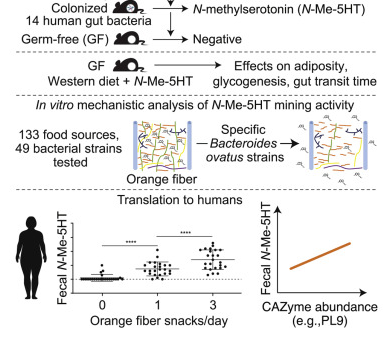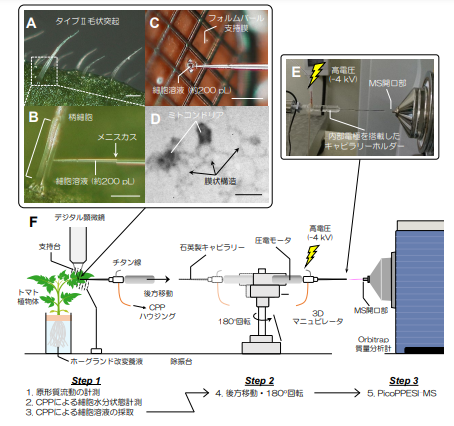ジュース製造時の副産物から遊離した分子が、代謝に好影響を与える Molecule liberated from byproduct of juice manufacturing has positive effects on metabolism
2022-06-27 ワシントン大学セントルイス
研究者達は、まず、一般的なヒト腸内微生物のコレクションを保有するマウス群と、微生物を全く保有せずに維持した、いわゆる無菌マウス群を研究しました。マウスには、米国で一般的に食べられているような高脂肪・低繊維の食事を与え、オレンジやエンドウ豆から回収した繊維を食事に加えた場合と加えない場合を検討した。その結果、N-メチルセロトニンは、マウスにヒトの腸内細菌の集合体を植え付け、オレンジの食物繊維を含む食事を与えたときにのみ遊離する分子であることが確認された。
49種類のヒト腸内細菌を調べた結果、ある種の腸内細菌「バクテロイデス・オヴァタス」に属する株が、オレンジの繊維からN-メチルセロトニンを効率よく採掘できることを突き止めた。
研究者たちは、N-メチルセロトニンの生物学的効果を調べた。無菌マウスに、オレンジ繊維を含まない高脂肪食を摂取させたところ、N-メチルセロトニンは脂肪蓄積を減らし、肝臓での糖代謝を改善し、腸管通過時間をより速くすることが確認された。
<関連情報>
- https://source.wustl.edu/2022/06/gut-bacteria-mine-dietary-fiber-to-release-beneficial-nutrients/
- https://www.cell.com/cell/fulltext/S0092-8674(22)00709-7
ノトバイオティックマウスおよびヒトにおけるオレンジ食物繊維からのN-メチルセロトニンの微生物による遊離について Microbial liberation of N-methylserotonin from orange fiber in gnotobiotic mice and humans
Nathan D. Han,Jiye Cheng Omar Delannoy-Bruno,Daniel Webber,Nicolas Terrapon,Bernard Henrissat,Dmitry A. Rodionov,Aleksandr A. Arzamasov,Andrei L. Osterman,David K. Hayashi,Alexandra Meynier,Sophie Vinoy,Chandani Desai,Stacey Marion,Michael J. Barratt,Andrew C. Heath,Jeffrey I. Gordon
Cell Published:June 27, 2022
DOI:https://doi.org/10.1016/j.cell.2022.06.004

Highlights
- Host-inaccessible compounds in discarded plant fibers are released by gut microbes
- Liberation of orange-fiber N-methylserotonin shows species/strain-level specificity
- N-methylserotonin affects adiposity, metabolism, and gut motility in gnotobiotic mice
- N-methylserotonin and bacterial CAZymes are correlated in orange-fiber-fed humans
Summary
Plant fibers in byproduct streams produced by non-harsh food processing methods represent biorepositories of diverse, naturally occurring, and physiologically active biomolecules. To demonstrate one approach for their characterization, mass spectrometry of intestinal contents from gnotobiotic mice, plus in vitro studies, revealed liberation of N-methylserotonin from orange fibers by human gut microbiota members including Bacteroides ovatus. Functional genomic analyses of B. ovatus strains grown under permissive and non-permissive N-methylserotonin “mining” conditions revealed polysaccharide utilization loci that target pectins whose expression correlate with strain-specific liberation of this compound. N-methylserotonin, orally administered to germ-free mice, reduced adiposity, altered liver glycogenesis, shortened gut transit time, and changed expression of genes that regulate circadian rhythm in the liver and colon. In human studies, dose-dependent, orange-fiber-specific fecal accumulation of N-methylserotonin positively correlated with levels of microbiome genes encoding enzymes that digest pectic glycans. Identifying this type of microbial mining activity has potential therapeutic implications.


